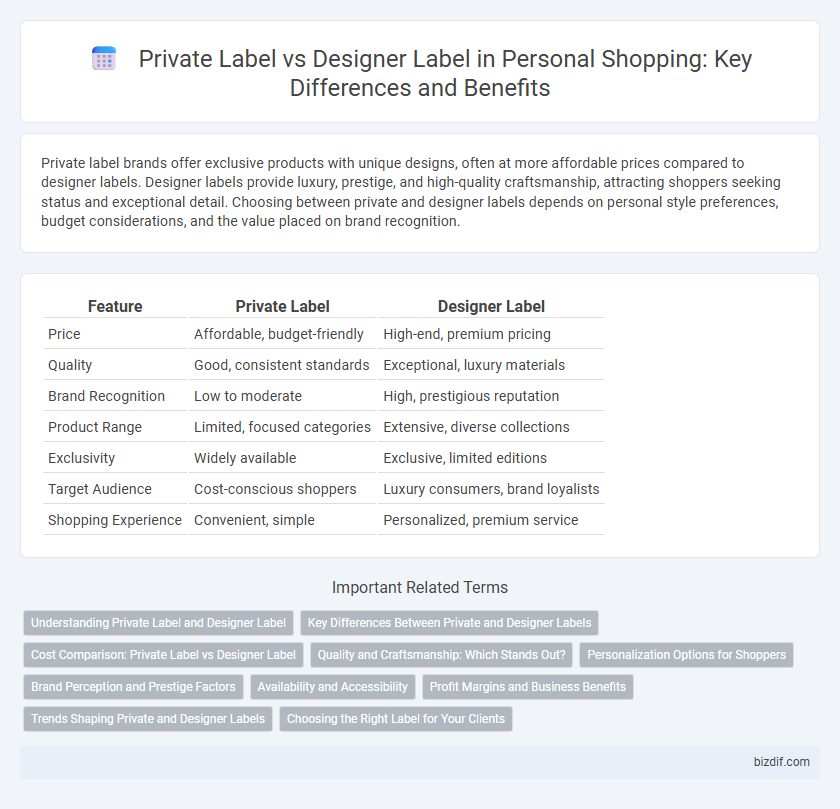Private label brands offer exclusive products with unique designs, often at more affordable prices compared to designer labels. Designer labels provide luxury, prestige, and high-quality craftsmanship, attracting shoppers seeking status and exceptional detail. Choosing between private and designer labels depends on personal style preferences, budget considerations, and the value placed on brand recognition.
Table of Comparison
| Feature | Private Label | Designer Label |
|---|---|---|
| Price | Affordable, budget-friendly | High-end, premium pricing |
| Quality | Good, consistent standards | Exceptional, luxury materials |
| Brand Recognition | Low to moderate | High, prestigious reputation |
| Product Range | Limited, focused categories | Extensive, diverse collections |
| Exclusivity | Widely available | Exclusive, limited editions |
| Target Audience | Cost-conscious shoppers | Luxury consumers, brand loyalists |
| Shopping Experience | Convenient, simple | Personalized, premium service |
Understanding Private Label and Designer Label
Private label products are manufactured by one company but sold under another company's brand, often offering exclusive designs and competitive pricing. Designer labels are created by recognized fashion brands known for their high-quality materials, craftsmanship, and prestige. Understanding the differences between private and designer labels helps shoppers make informed choices based on budget, style preferences, and brand value.
Key Differences Between Private and Designer Labels
Private labels are products created and sold by a retailer under its own brand, offering competitive pricing and control over production, while designer labels are established fashion brands known for high-quality materials, exclusive designs, and premium pricing. Private labels focus on affordability and adaptability to market trends, whereas designer labels emphasize brand prestige, craftsmanship, and limited availability. Consumer preference between the two often depends on budget, brand loyalty, and the desired balance between uniqueness and value.
Cost Comparison: Private Label vs Designer Label
Private label products typically offer a more affordable cost structure compared to designer labels due to lower marketing and retail expenses. Designer labels command premium prices driven by brand reputation, exclusivity, and high-quality materials, resulting in significantly higher price points. Consumers seeking budget-friendly options often prefer private labels for comparable style and quality at a fraction of the cost.
Quality and Craftsmanship: Which Stands Out?
Private label brands often emphasize affordability while maintaining consistent quality through streamlined manufacturing processes, catering to budget-conscious shoppers. Designer labels distinguish themselves with superior craftsmanship and premium materials, reflecting meticulous attention to detail and exclusive designs. The choice between private and designer labels ultimately hinges on valuing cost-efficiency versus unparalleled quality and artistry.
Personalization Options for Shoppers
Private labels offer extensive personalization options, allowing shoppers to customize products with unique colors, monograms, and tailored fits that cater to individual preferences. Designer labels typically provide limited personalization, often restricting customization to select accessories or engraving services. Shoppers seeking tailored, exclusive products find private labels more adaptable to their personal style and requirements.
Brand Perception and Prestige Factors
Private label brands often emphasize value and accessibility, appealing to consumers seeking quality products at competitive prices without the high cost associated with designer labels. Designer labels, however, carry a strong perception of prestige, exclusivity, and heritage, often linked to luxury, craftsmanship, and status symbols. The choice between private label and designer label hinges on consumer priorities for brand authenticity, social signaling, and long-term brand loyalty.
Availability and Accessibility
Private label products offer greater availability and accessibility, often found in a wide range of retail stores and online platforms at various price points. Designer labels are typically limited in distribution, available mainly in brand boutiques, high-end department stores, and exclusive online outlets, making them less accessible to the general public. Consumers seeking convenience and budget-friendly options usually prefer private labels, while those prioritizing brand prestige may accept the restricted availability of designer labels.
Profit Margins and Business Benefits
Private label products typically offer higher profit margins compared to designer labels due to lower production and marketing costs, allowing retailers greater control over pricing and brand identity. Designer labels benefit from established brand recognition and customer loyalty, which can drive premium pricing but often come with higher wholesale costs and smaller margins. Businesses leveraging private labels can enhance profitability through exclusive offerings and flexible promotions, while designer label partnerships support traffic generation and brand prestige.
Trends Shaping Private and Designer Labels
Private labels rapidly adapt to emerging consumer trends by offering affordable, on-trend pieces with quick turnaround times, leveraging data-driven insights for personalized shopping experiences. Designer labels emphasize heritage and exclusivity, integrating innovative materials and sustainable practices to maintain luxury appeal while responding to growing environmental consciousness. Both private and designer labels increasingly harness digital platforms and influencer collaborations to capture diverse market segments and shape fashion trends dynamically.
Choosing the Right Label for Your Clients
Private label brands offer personalized exclusivity and often deliver high-quality products at competitive prices, making them ideal for clients seeking unique and affordable options. Designer labels carry prestige and established brand recognition, appealing to clients who value luxury, craftsmanship, and status symbols. Understanding your client's lifestyle, budget, and fashion preferences is crucial for selecting between private label and designer label to ensure satisfaction and alignment with their personal brand.
Private label vs Designer label Infographic

 bizdif.com
bizdif.com